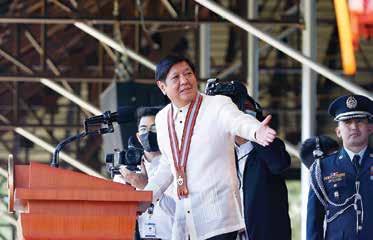
2 minute read
Marcos rejects ICC probe on Duterte

PRESIDENT Ferdinand Marcos Jr. on Saturday, February 18 rejected a move by the International Criminal Court (ICC) to resume its investigation into former president Rodrigo Duterte's war on drugs, saying the ICC has no jurisdiction and insisting that the country has a "good" justice system.
Advertisement
Speaking to reporters on the sidelines of the Philippine Military Academy's alumni homecoming in Baguio City, the President maintained that the Philippines would not cooperate with the ICC investigation which, he said, would be an "intrusion into our internal matters" and "a threat to our sovereignty."
"My position has not changed. I have stated it often, even before I took office as president, that there are many questions about (ICC's) jurisdiction and what we in the Philippines regard as an intrusion into our internal matters and a threat to our sovereignty," the President said.
Marcos, a known Duterte ally, said he would not allow "former imperialists," such as the ICC, to control the Philippines, unless it could be proven that the international court has jurisdiction over the country.
"So, that is not something that we consider to be a legitimate judgment. So, until those questions of jurisdiction and the effects on the sovereignty of the Republic are sufficiently answered, we cannot cooperate with them," he said. PAGE 2
by PAOLO ROMERO Philstar.com
MANILA — Senators have filed resolutions strongly opposing the International Criminal Court (ICC)’s move to proceed with its probe on former president Rodrigo Duterte for alleged crimes against humanity committed in his administration’s war on drugs.
Sen. Jinggoy Estrada filed Senate Resolution 492 expressing the chamber’s strong opposition to the resumption of the ICC investigation on the Duterte administration’s bloody campaign against illegal drugs that left over 6,000 suspects dead in police operations. Estrada said the decision of the ICC’s Pre-Trial Chamber to authorize the resumption of the probe is “disrespectful of the Philippines’ sovereignty and undermines the country’s fully capable judicial system.”
The senator cited the government’s efforts in reviewing the anti-drugs operations of the Philippine National Police (PNP)’s anti-narcotics group, which has prompted the PNP Internal Affairs Service (IAS) and the Department of Justice (DOJ) to file four criminal cases against abusive police officers.
SENATORS are eying the growing shortage of health care workers in the United States as one of the few problems where there is room for bipartisan solutions, even in a deeply divided Congress gearing up for a presidential election cycle.
The shortage that’s only worsened since the pandemic is a prescription for skyrocketing costs, suffering, and unnecessary death, Sen. Bernie Sanders (I-Vt.), the new chairman of the Senate’s top health committee, warned in his committee’s first hearing Thursday.
“We are going to produce legislation, and I think people will be surprised about the level of bipartisan supporters,” Sanders said in a brief interview during a break from the hearing. He called for the committee to “produce something meaningful.”
The shortage of health care workers of all sorts is a widespread problem, but is especially acute in rural areas and minority communities. Sanders pointed to the startling






